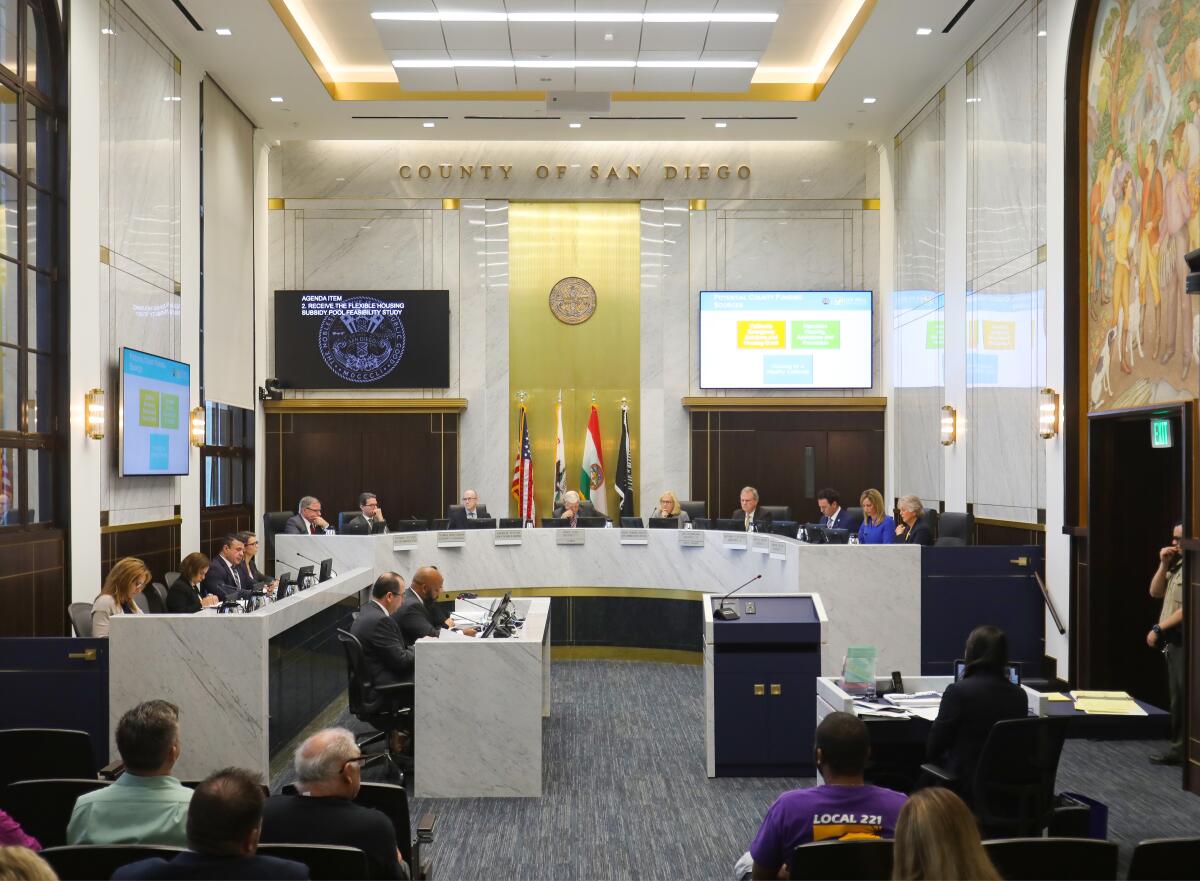Court tosses San Diego County climate plan, calls carbon-offset program ‘unlawful’

SAN DIEGO — A state court has struck down a San Diego County plan to allow housing developers to buy their way around restrictions on greenhouse-gas emissions from new vehicle traffic using so-called carbon offsets.
The 4th District Court of Appeal in San Diego issued its ruling last week in response to a lawsuit brought by the Sierra Club, Center for Biological Diversity, Climate Action Campaign and other environmental groups.
Specifically, the three-judge panel’s decision tossed out the county’s latest adopted Climate Action Plan — the sixth such ruling in nearly a decade.
State Atty. Gen. Xavier Becerra celebrated the ruling on Twitter, saying: “Victories like this will help California get back on track to meet its greenhouse gas reduction goals.”
The county was relying on the offset program as part of an ongoing push to approve a slate of housing projects on undeveloped land throughout unincorporated territory, such as Newland Sierra, Lilac Hills Ranch and Adara at Otay Ranch.
Last year, the county sought to approve eight new projects totaling about 10,000 new units, but nearly all have been derailed or delayed by lawsuits.
Many of those projects have been individually challenged in court by environmental groups. Those groups point to the tail-pipe emissions that would be created by additional traffic. Also, nearly all of the projects are located in wildfire-prone areas.
Becerra’s office argued in an amicus brief from November that the county’s offset scheme could undermine the state’s ambitious goals of slashing emissions by 40 percent by 2030 and 80 percent by 2050.
“This is huge,” said Pete Andersen, who serves on the local chapter of the Sierra Club’s conservation and legal committees. “Let’s stop these projects that are causing sprawl and vehicle-miles traveled.”
The Board of Supervisors will now have to vote to appeal the decision to the state Supreme Court or go back to the drawing board.
“I am disappointed that the board’s determination to approve the [climate plan] can be overturned by a few individuals and special interest groups over unclear state guidelines,” said Republican Supervisor Jim Desmond. “We are in desperate need of housing in the region and this type of court determination undermines our ability to provide entry-level housing to the unincorporated area.”
The county, like most municipalities, is under pressure from the state to ramp up new home construction. Experts have said that an increase in supply could help address the state’s affordability crisis.
County counsel, as well as Republican Supervisor Greg Cox, who chairs the board, declined to comment on the ruling.
“Our county has ignored the undeniable facts about climate change for too long. Let’s redirect our energy towards creating a Climate Action Plan that implements real change,” said Supervisor Nathan Fletcher, a Democrat who voted against appealing the lower court ruling last year.
Offsets are most often purchased by state regulated businesses or corporations looking to green-up their public image. They buy the credits through online storefronts known as registries, where groups engaged in land conservation, sustainable agricultural and logging practices as well as other identified activities sell them on a per-ton basis.
Lawyers for the county argued that San Diego’s offset program should be allowed under state law because it was not substantially different from how California uses offsets under its cap-and-trade program.
However, the appellate court strongly disagreed, calling the defendant’s approach “unlawful” and based on “unenforceable performance standards.”
The judges noted that while the state has strict rules for monitoring and ensuring that offsets represent real reductions in greenhouse gas, the county had no such quality controls. The program gave broad discretion over running the program to the county’s planning director.
Another noted difference was that while the state’s program has been largely limited to offset projects in the United States, San Diego’s approach would’ve allowed the use of offsets generated anywhere around the world.
The court also pointed out that the state’s program under cap-and-trade has only allowed businesses to cancel out up to 8 percent of their emissions using offsets. The county’s approach would’ve allowed projects to offset upwards of 100 percent of their carbon footprint.
However, the court added that its ruling “should not be construed as blanket prohibition on using carbon offsets.” That could be read by the county as an invitation to draft a more stringent offset program as part of an overhauled climate plan.
Still, according to legal experts, it’s not clear that even such a more detailed approach would hold up in court if the offsets were being generated outside of the state. Municipal climate plans, legally required as part of general plan updates, are intended to help the state meet its larger climate goals.
While California allows businesses to use offsets under the cap-and-trade program, the state still counts those canceled-out emissions as part of its overall carbon footprint. Offsets were included simply as a cost-containment mechanism under the larger emissions-trading program.
If new housing developments in San Diego County were allowed to bypass state environmental law using offsets, the resulting vehicle emissions would still add to the state’s official emissions tally. It also means the county’s offset program could undermine the state-mandated targets for cutting down on driving in the region.
“It’s not consistent with state policy in that respect,” said Ethan Elkind, director of UC Berkeley’s Center for Law, Energy and the Environment. “The offsets to really be legally defensible would have to be offsets within the county.”
More to Read
Sign up for Essential California
The most important California stories and recommendations in your inbox every morning.
You may occasionally receive promotional content from the Los Angeles Times.











